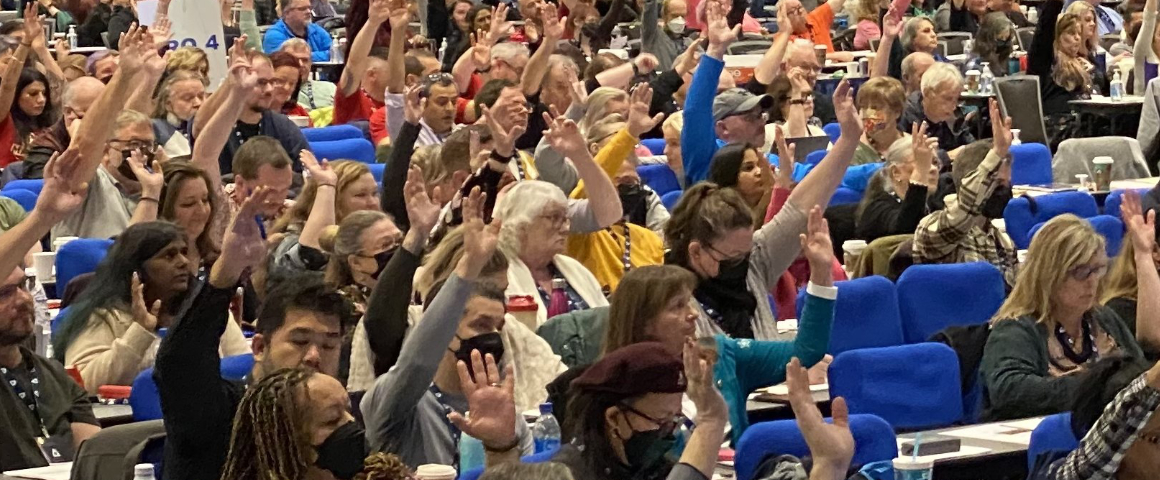PV Vancouver Bureau
The first full in-person convention of the BC Federation of Labour since 2018 took place November 21-25 in Vancouver. Held on the theme “Workers Front and Centre,” it was a welcome event for the 1000 delegates, many of them fairly new participants in the labour movement.
Retiring president Laird Cronk was replaced by Sussanne Skidmore, who was first elected as the BCFED’s secretary-treasurer in 2018. A long-time human rights, social justice and queer rights activist, Skidmore had previously served as executive vice-president of BCGEU for five years.
The new secretary-treasurer is Hermender Singh Kailley, who had been active in IATSE Local 118 and then ILWU Local 502, and also served on the executive of the New Westminster and District Labour Council. Kailley is the first South Asian to be elected to a top BCFED position.
But while some new faces were elected to the BCFED executive council, this was very much a “stay the course” convention, with muted criticisms of the only NDP government in Canada. While five years have passed since the anti-labour BC Liberals were defeated, memories of the Gordon Campbell-Christy Clark era remain deeply etched in the collective memory of trade unionists on the west coast.
Among rank and file delegates, there was some grumbling that the militant tone of some previous conventions was missing. The prevailing mood of the Federation’s leadership was to encourage the NDP government (now led by Premier David Eby) to adopt some progressive changes, but without projecting any hint of grassroots mobilization or anger.
Only about ten hours of the convention agenda over five days was allocated to debate on resolutions. A number of those did cover important ground, giving delegates time to speak eloquently on a wide range of struggles for labour rights, social justice, Indigenous rights, workplace health and safety and other demands. But the resolutions were limited to lobbying and encouraging governments; in a few cases where the original submitted text called to “pressure” or “push” the BC government, this was edited out before debate.
Typical was an important resolution (submitted by MoveUp and BCGEU), calling on the BC government “to tackle food insecurity and poverty by raising income assistance and the minimum wage to the level of the highest living wage in BC within the next five years and then adjust annually so no one has to choose between food or rent.” This would mean setting these rates at the equivalent of $27 per hour, the level proposed by Living Wage campaigns in British Columbia. But the text was limited to lobbying for this crucial demand, and the debate focused on support for collecting food bank donations at workplaces.
Another example concerned the need for higher government funding for public education. As one delegate from the BC Teachers’ Federation pointed out, the NDP has failed to tackle this problem but continues to provide major supports for private schools in British Columbia. This sharp reminder at the microphone was about as close to a criticism as the convention heard.
A large number of resolutions focused on various equity issues and were adopted unanimously. As one building trades delegate correctly noted, this reflected important progress in the labour movement.
Other important demands included: to include dental care and pharmacare as medically necessary services covered by Medicare; to expand safe supply and other urgent plans to tackle the overdose crisis; genuine rent controls tied to the rental unit, not the tenancy agreement; expand rather than erode public sector services; legislate annual cost-of-living allowances as a minimum employment standard for all workers and at least fifteen annual days of employer-paid illness or injury leave.
A key resolution on the climate change crisis was submitted by BCGEU and BCTF. It calls on governments to invest in “training and continued employment for workers exiting the fossil fuel industry through nationalizing the energy industry and beginning a controlled reduction in the production of fossil fuels in a swift transition to a renewable energy economy.”
In a province where the NDP government remains firmly committed to massive taxpayer subsidies for the fossil fuel industry, this position – if pushed by the Federation – has the potential to spark a real debate on the economy and energy issues heading into the next election expected in 2024.
There was little debate on international issues such as the need for a global reduction of military spending. One resolution did call for solidarity with the labour movement in Iran, but another gave support for the campaign to impose sanctions on Russia, presenting a very one-sided view of the war in Ukraine.
[Photo: BCFED Twitter]
Get People’s Voice delivered to your door or inbox!
If you found this article useful, please consider subscribing to People’s Voice.
We are 100% reader-supported, with no corporate or government funding.




